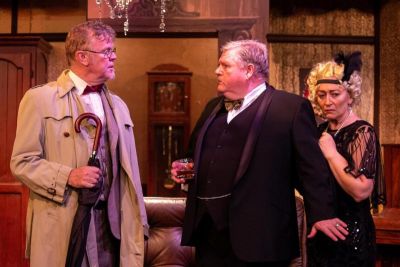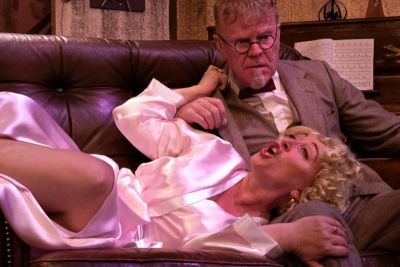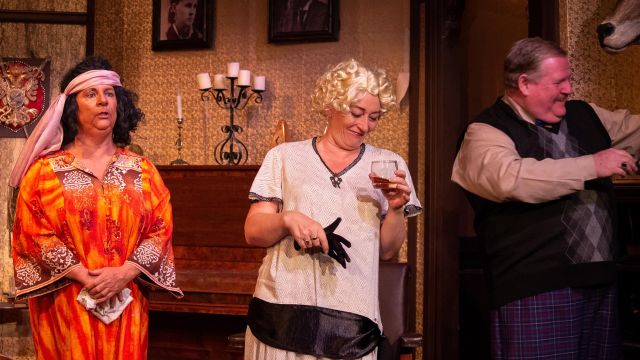Any Number Can Die
Imbued with the spirits of a hundred whodunnits, this comedy-mystery presented by Tea Tree Players is a pastiche of intrigue and intricacy, delivered by a twelve-strong cast and well-packaged by director Theresa (Lilly) Dolman.
An estranged family and other hangers-on gather in an old mansion on a stormy island off the American coast to hear the reading of a will (at midnight, obviously). There is mystery aplenty and the plot is held together by a duo of first-case private investigators Ernestine Wintergreen (Lesley Main) and Hannibal Hix (Rick Mills).
Everyone has a secret, not everyone is who they say they are, and when the lights flicker in the thunder and lightning, there’s a murder. Then another. There are unexpected guests and cryptic clues – and a hilarious scene where the detective can’t get a straight answer, despite the warning that they’ll get shot before they can reveal the shocking detail.
 Dolman directs the ensemble well: the actors are never crowded even when there are ten on stage and the audience never gets confused as to who is who – except when Fred Carmichael’s script introduces this deliberately!
Dolman directs the ensemble well: the actors are never crowded even when there are ten on stage and the audience never gets confused as to who is who – except when Fred Carmichael’s script introduces this deliberately!
Rick Mills and Lesley Main know how to keep an audience close – their conversations are genuine, they perform with their bodies as much as their words, and they have great comedy timing, immersing the audience in the action and carrying them along with their telling of the story.
Adrian Heness is suitably stern as the lawyer, Roger Masters; Tina Hall enjoys the pomposity of Celia Lathrop and her resigned husband T J is quietly played by Tim Cousins. Annika Barry brings naïve positivity to Sally Van Viller, Lachlan Blackwell revels in the slimy scheming of Carter Forstman and Daniel Toy suggests a dashing Jack Regent, though the affections (and lack of them) between these three aren't entirely convincing. Edgars the butler is underplayed by a young Harrison Morris; Steven Brown and Kaila Barton play a newly married couple that unnecessarily introduce the play sixty years on from the events that follow.
 The melodramatic mystery of the hired help Zenia is wonderfully explored by Chris Galipo: how she delivers yet another line on a hooting owl without laughing is one of those mysteries. Her costume is more sixties tie-dye than twenties Creole, but it serves as a contrast to the fabulous period dress worn by the rest of the cast and designed by Jo Allenby T J Lathrop’s bobble-topped peaked cap deserved its own entrance.
The melodramatic mystery of the hired help Zenia is wonderfully explored by Chris Galipo: how she delivers yet another line on a hooting owl without laughing is one of those mysteries. Her costume is more sixties tie-dye than twenties Creole, but it serves as a contrast to the fabulous period dress worn by the rest of the cast and designed by Jo Allenby T J Lathrop’s bobble-topped peaked cap deserved its own entrance.
The director’s set design is fantastic: there is incredible detail in the musty and dusty old house, yet nothing is wasted; everything has its purpose. There are so many ways on and off the stage in this play but their introduction is clever and even when you know it’s coming, often unexpected in its execution. It’s lit well by Robert Andrews and Mike Phillips: the lighting offers intimacy to a quiet conversation then washes the width of the stage when the room is full; it gives us the depth of the house, suggesting many more rooms and passageways than can be presented on the stage.
 Playing to stereotypes requires skill in walking the tightrope of comedy: it’s easy to fall to offence, yet Dolman and the cast just about keep their balance. Their Carolina and Creole accents slip in and out more often than the secret panels, but they’re only important to ground the setting in Prohibition America. The sound effects (also from Andrews and Phillips) are deliberately low quality and all the funnier for it. The self-awareness of these well-trod characterisations and components of the genre would have worked with even more exaggeration and melodrama.
Playing to stereotypes requires skill in walking the tightrope of comedy: it’s easy to fall to offence, yet Dolman and the cast just about keep their balance. Their Carolina and Creole accents slip in and out more often than the secret panels, but they’re only important to ground the setting in Prohibition America. The sound effects (also from Andrews and Phillips) are deliberately low quality and all the funnier for it. The self-awareness of these well-trod characterisations and components of the genre would have worked with even more exaggeration and melodrama.
The unravelling of murder-mysteries is well-worn territory for stage plays but even though this is a deliberate parody of those, Tea Tree Players builds the tension well and releases only just enough with each reveal that there’s sufficient surprise for the audience to gasp at the final exposé.
Mark Wickett
Subscribe to our E-Newsletter, buy our latest print edition or find a Performing Arts book at Book Nook.

